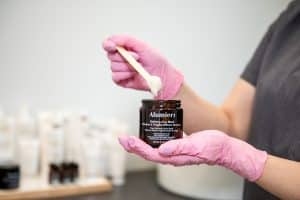Unlocking the Secrets of Chemical Peels: Exploring Their Benefits for Your Skin
Chemical peels have long been hailed as a skincare staple for achieving smoother, brighter, and more youthful-looking skin. But do they truly live up to the hype? In this blog, we’ll delve into the world of chemical peels, examining their effectiveness, benefits, and considerations for incorporating them into your skincare routine.
Understanding Chemical Peels
- What Are Chemical Peels? Chemical peels are skincare treatments that involve the application of a chemical solution to the skin, which exfoliates and removes dead skin cells, impurities, and imperfections. This process stimulates cell turnover and collagen production, resulting in smoother, firmer, and more radiant skin.
- Types of Chemical Peels: Chemical peels come in various strengths and formulations, ranging from superficial peels, which target the outermost layer of the skin, to deep peels, which penetrate deeper into the skin’s layers. Common types of chemical peels include glycolic acid, salicylic acid, lactic acid, and trichloroacetic acid (TCA) peels.
Benefits of Chemical Peels
- Exfoliation: Chemical peels effectively exfoliate the skin, removing dead skin cells and debris that can clog pores and dull the complexion. This promotes cell turnover and reveals fresh, new skin underneath, resulting in a smoother and more even skin texture.
- Improves Skin Tone: Chemical peels can help to improve skin tone and reduce the appearance of hyperpigmentation, sun damage, and age spots. By targeting discolouration and uneven pigmentation, chemical peels promote a more uniform and radiant complexion.
- Reduces Acne and Breakouts: Chemical peels are beneficial for individuals struggling with acne-prone skin, as they help to unclog pores, reduce inflammation, and control excess oil production. Regular chemical peel treatments can help to minimise breakouts and improve overall skin clarity.
- Diminishes Fine Lines and Wrinkles: Chemical peels stimulate collagen production, which helps to plump and firm the skin, reducing the appearance of fine lines and wrinkles. Over time, regular chemical peel treatments can help to improve skin elasticity and diminish the signs of ageing.
- Enhances Product Penetration: By removing the outermost layer of dead skin cells, chemical peels enhance the penetration of skincare products, allowing active ingredients to absorb more effectively into the skin. This maximises the benefits of your skincare routine and ensures optimal results.
Considerations Before Undergoing a Chemical Peel
- Skin Type and Sensitivity: Not all skin types are suitable for chemical peels, and certain skin conditions may be contraindicated. Individuals with sensitive skin, rosacea, eczema, or dermatitis should consult with a skincare professional before undergoing a chemical peel to determine their suitability for treatment.
- Sun Protection: Following a chemical peel, the skin may be more sensitive to the sun’s harmful UV rays. It’s essential to wear sunscreen daily and avoid excessive sun exposure to protect the skin and minimise the risk of post-inflammatory hyperpigmentation.
- Downtime and Recovery: Depending on the strength and depth of the chemical peel, individuals may experience varying degrees of downtime and recovery. Superficial peels typically require minimal downtime, while deeper peels may involve several days of peeling and redness as the skin heals.
- Preparation and Aftercare: Prior to undergoing a chemical peel, individuals may need to prepare their skin with specific skincare products to optimise results and minimise the risk of adverse reactions. Additionally, following proper aftercare instructions, such as avoiding exfoliating products and harsh skincare ingredients, is crucial for ensuring a smooth and successful recovery.
Conclusion
In conclusion, chemical peels are highly effective skincare treatments that offer a range of benefits for improving the health and appearance of the skin. From exfoliating and brightening the complexion to reducing acne, fine lines, and hyperpigmentation, chemical peels can address a variety of skincare concerns with remarkable results. However, it’s essential to consider factors such as skin type, sensitivity, and downtime before undergoing a chemical peel and to consult with a qualified skincare professional to determine the most suitable treatment plan for your individual needs. With proper care and attention, chemical peels can help you achieve smoother, clearer, and more youthful-looking skin that radiates with confidence and vitality.




